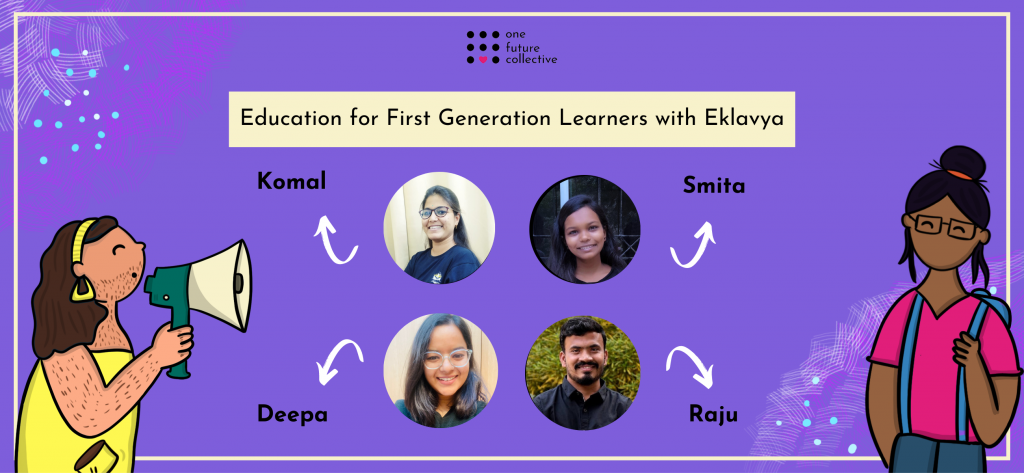On 20th February 2022, One Future Collective hosted an IG live on the theme “Education for First Generation Learners with Eklavya.” Deepa, a Development Professional with a clinical counselling diploma from TISS, acted as the Moderator and was joined by Raju Kendre, Founder & CEO of Eklavya India Movement, Komal, a First-generation learner & Master’s student at Azim Premji University, and Smita, a SBI Youth for India Fellow & Deputy Head at Village Council.
The conversation covered first-generation learners’ experiences, feelings, and journeys in India. In addition to that, the session also aimed to understand the state of implementation of current educational policies and changes that were necessary to uplift marginalized communities.
The conversation started with all three speakers’ sharing their journeys to pursue higher education and the challenges they faced as they were the first to pursue higher education within their communities. Komal admits to the immense impact Eklavya has had on her educational aspirations as she received guidance on how to fill up forms and apply for scholarships to overcome financial restraints. She shared how all her classmates from school were currently married and managing an entire household with children at a young age. She spoke of a lack of awareness and the quality of education in her village, which was quite dismal.
Smita recounted how she used to walk home from her hostel for 5 km as there was (and still is) no bus route to her village. Despite the language barrier, a lack of confidence, and financial constraints, She enrolled in a BSW degree. She worked part-time to support herself. During her graduation, she learned about Eklavya, where she got exposed to diverse courses to choose from to continue her education.
Eklavya, as a not-for-profit organization, aims to contribute to Phule and Ambedkar’s movement of democratizing education. Raju talked about how the number of people from rural and marginalized communities in the development sector were relatively minor. Most of the organizations consist of people from metropolitan cities instead of including people with lived experiences of social problems. He said, “Eklavya worked to fill the gap by conducting residential, 1-day workshops and orientations for students from tribal communities”. Raju further spoke of how nobody guided him about the opportunities that students can avail, so he wants to inspire other students and help them become educational development leaders.
They discussed the available data by the All India Survey of Higher Education of an increase of 1,350 per cent in enrollment of students and if that was an accurate representation of the ground reality. They said that the data was quite incomplete and it was important to check what kinds of institutes it included in its ambit. Komal showed skepticism about the data and discussed how her lived experiences were in stark contrast to these numbers. She mentioned that while there are schemes like ‘Beti Bachao, Beti Padhao’ or ‘Balika Samriddhi Yojana’ on paper, the students from marginalized communities are mostly unaware of these. Raju remarked how the tribal belt that he comes from has no college within a distance of 200 km. According to Raju, there is massive inequality in higher education as private institutes rarely have students from marginalized backgrounds.
As the deputy sarpanch of her village, Smita spoke of her plans to increase literacy and higher education. She mentioned how she used her powers to add a sports institute and fix a regular bus timing in the village to travel safely.
They further discussed the impact of Covid-19 on Eklavya’s programs and how the digital medium was inaccessible to most students. Due to the closing of schools, most SC/ST students lost out on education and socio-emotional learning, and peer bonding. Raju spoke of how Eklavya tried to create workshops on blended mode and adapt to the situation.
All the speakers agreed that the system does not enable students from marginalized communities to pursue higher education but holds them back actively. Smita mentioned how the current schemes must be implemented properly and improve the existing infrastructure. Raju spoke of how there needs to be a change in societal views as Eklavya often had to intervene and talk to the parents of young girl students. He talked about the need to decentralize central schools and universities and encourage interdisciplinary courses. Smita agreed that most students do not have the social or financial capital to even dream of studying in private institutes like Amity or Ashoka university.
Closing the discussion, Komal discussed the kind of changes that could be made to bridge the higher education gap. She spoke of the need for developing soft skills like public speaking, communication, and creative writing, so they could aspire for and pursue higher education. She concluded by discussing how education is for all, and there needs to be more awareness-raising and capacity-building for students.
Link to the video: https://www.instagram.com/p/CaNFxnKrm74/
